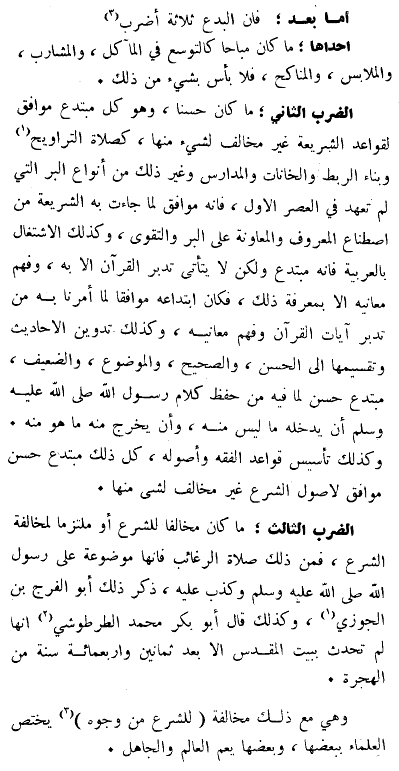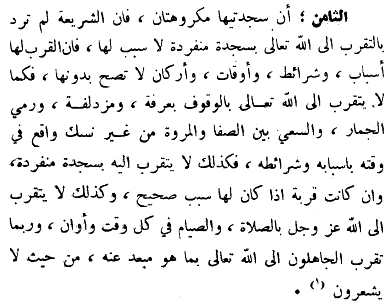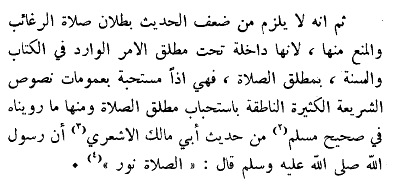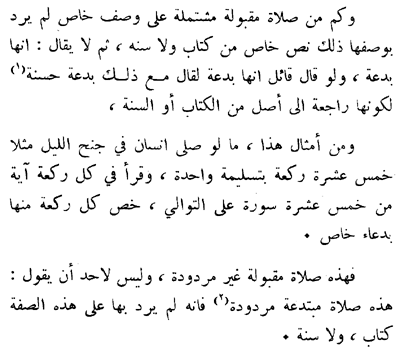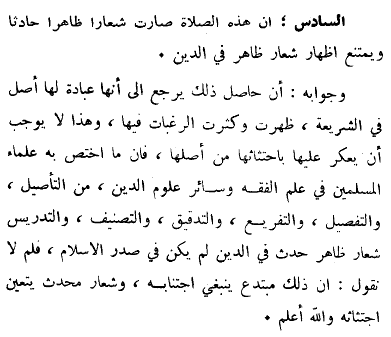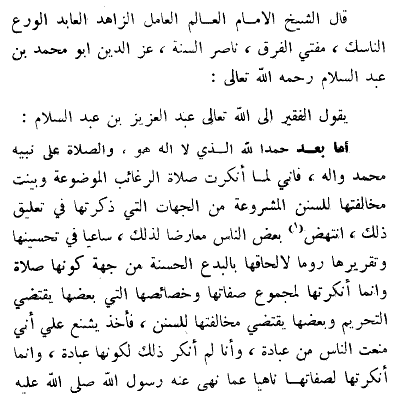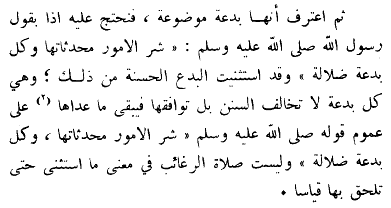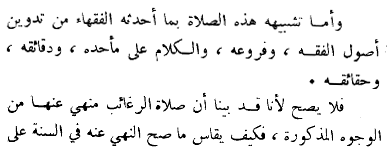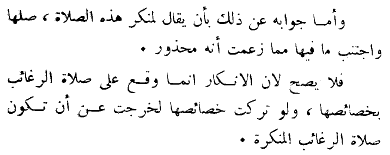 Refutations
Refutations
 Bidah Hasanah
Bidah Hasanah
|
Refuting the Notion of Bid'ah Hasanah (Good Innovation) in Worship: Part 6 - Al-Izz Bin Abd Al-Salam's Refutation of a Claimed 'Bidah Hasanah' and Refutation of the Doubts of Contemporary Innovators
Posted by Abu.Iyaad, Editor in Bidah Hasanah Topics: Bidah Hasanah • Good Innovation • Al-Izz Bin Abd Al-Salam |

Introduction and Background
We have firmly established that the scholars distinguish between the linguistic usage of the term bidah (البدعة) and the Shariah usage of the term bidah, and we have also explained that whenever any Scholar has used the word bidah in a praiseworthy way, it is being used strictly in its linguistic sense and not the Shariah sense. This was established from Ibn Hajar (in this article) and likewise Ibn Rajab al-Hanbali.
We also clarified in the previous article, that there is absolutely nothing in al-Izz bin Abd al-Salam's classification of bidah into wajib (obligatory), mandub (recommended) and mubah (permissible) which allows or which shows that he intended it to allow innovation into matters of worship. For reminder's sake, we will repeat that here, because it is necessary for what is to follow in this article:
We also established in the previous article through five or six fatawa of al-Izz bin Abd al-Salam, that there is strong indication of a general spirit that is different to what the innovators of today are upon, who wrongly use his classification of bidah to justify departure and opposition to the Sunnah and introduction of innovations which have no basis at all in the Shariah, or which have a basis but which differ in their details and particulars from what is in the Sunnah.
These innovators have a vague and generalized form of argument (after a wrong reading of this classification by the likes of al-Izz bin Abd al-Salam) which is as follows:
If something has a foundation in the Shariah, then it is not counted as a blameworthy innovation but is a praiseworthy innovation.
In such a broad and vague way, these innnovators try to pull the wool over the eyes of many unsuspecting general Muslims who sincerely wish to follow the Messenger (alayhis salaam) but are drawn instead towards innovated matters for which Allah sent down no authority and which neither the Messenger nor his Companions practised. They make the above statement to appear as if it is in agreement with what certain Scholars have stated, but those Scholars do not in fact intend what these innovators intend.
The aim of this article then, by Allaah's permission, is to pound and smash this argument and what better way to do it than use the writings of al-Izz bin Abd al-Salam himself! Abject humility for today's innovators who misuse his words and misrepresent his intent for their own falsehood!
So please sit back, watch decades of deception and treachery destroyed in less than ten minutes, by Allaah's permission. Enjoy and rejoice!
The Debates Between al-Izz bin Abd al-Salam and Ibn al-Salah Regarding the Innovated Salat al-Raghaa'ib
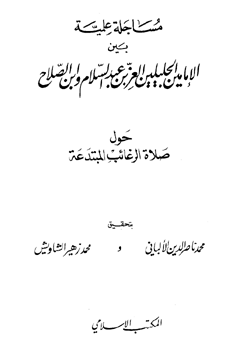 In the seventh century hijrah (after 600H) a written debate took place between al-Izz bin Abd al-Salam (d. 660H) and Ibn al-Salah (d. 643H). It is related that al-Izz, when he took occupation of leadership and giving sermons ended many of the innovations that the khatibs and common people were upon (Tabaqat al-Shafi'iyyah al-Kubra 5/80) and from those affairs was the prayer called Salat al-Ragha'ib, and he explained that it is an evil innovation.
In the seventh century hijrah (after 600H) a written debate took place between al-Izz bin Abd al-Salam (d. 660H) and Ibn al-Salah (d. 643H). It is related that al-Izz, when he took occupation of leadership and giving sermons ended many of the innovations that the khatibs and common people were upon (Tabaqat al-Shafi'iyyah al-Kubra 5/80) and from those affairs was the prayer called Salat al-Ragha'ib, and he explained that it is an evil innovation.
This raises a very important and helpful situation which is that as there is a great dispute between the true followers of the Sunnah, the followers of the Righteous Salaf and those grave-worshipping Sufis of today [who make lip-service in their claim of following the Messenger (alayhis salaam)] about the understanding and application of term "bidah (البدعة)", then we find here a great acid test to find out the truth from the falsehood and the genuine from the fake. Since, these innovators claim attachment to al-Izz bin Abd al-Salam, and in particular his classification of bidah (into wajib, mandub, mubah), then what better way to distinguish between what he actually means by it and how todays innovators twist it except by taking an actual innovation he himself refuted so we can see his particular understanding and application of the word bidah in action in broad daylight, such that there can not be any dispute or argument thereafter at all.
 So we have our acid-test kit ready, and we await for the great moment of truth. We advise all readers (those who have been misled or who hold on to doubts) to put aside all whims and desires and accept the truth when it becomes clear and to fear the perversion of the heart, for when one deliberately and obstinately rejects the truth which stares him in the face, Allaah causes his heart to become perverse and misguided and make him blind to the truth.
So we have our acid-test kit ready, and we await for the great moment of truth. We advise all readers (those who have been misled or who hold on to doubts) to put aside all whims and desires and accept the truth when it becomes clear and to fear the perversion of the heart, for when one deliberately and obstinately rejects the truth which stares him in the face, Allaah causes his heart to become perverse and misguided and make him blind to the truth.
What is Salat al-Ragha'ib
This is an innovated form of prayer which involves many repetitions of certain Surahs (Surah al-Ikhlas and Surah al-Qadr) and certain remembrances in twelve rakahs at the end of which there are two prostrations (after the tasleem). It is supposed to be done on a Friday night, preferably in the month of Rajab, preferably when one has been fasting and performed just prior to breaking one's fast. This was being practised by the people in the time of al-Izz bin Abd al-Salam, and it was found in popular books such as Iyha Ulum al-Din of al-Ghazali. So he wrote a tract in refutation of it. Ibn al-Salah had a different view and considered it an acceptable ibadah (act of worship) and so he wrote a defence of it by writing against al-Izz's tract. Al-Izz then wrote another response and refuted Ibn al-Salah. Now al-Izz was not the only one who rejected it, it was also rejected by Abu Shaamah Shihab al-Din al-Maqdisi (d. 665H), Abu al-Khair Qutb al-Din Muhammad al-Zubaydi (894H), Abu Bakr al-Turtushi, Ali bin Ibraheem al-Attaar, al-Nawawi, Ibn Taymiyyah, Zakariyaa al-Ansari and others.
This debate has been referred to bin al-Yaafi'ee in Mar'aat al-Janaan (5/144):
There occurred between him (al-Izz) adn the Shaikh of Dar al-Hadith, the Imaam Abu Amr bin al-Salah very severe, intense disputations about that (the prayer) and each of them wrote in refutation of the other. And the investigating (scholars) judged the position of the Imam Ibn Abd al-Salam to be correct, and they testified for him with manifestation of the truth and correctness in those [raging] wars and battles.
A manuscript of these written debates is present and dated 712H being written by Ahmad bin Yahya bin Basharah, they comprise of three tracts (al-Izz's first tract, then Ibn al-Salah's refutation, then al-Izz's counter refutation). The manuscript also contains a fatwa of al-Nawawi in this very matter. Al-Subki also cites the first tract of al-Izz in his Tabaqat al-Shafi'iyyah al-Kubraa (5/105-107) but it is deficient and not complete. These are pictures of the first title pages of the initial tract of al-Izz and the response by Ibn al-Salah.
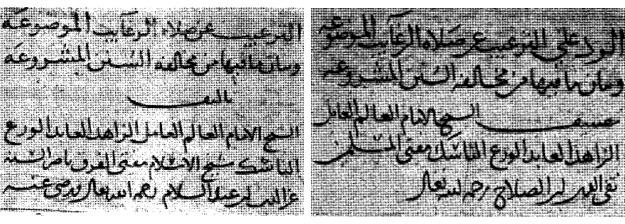
The three tracts together are very valuable and should really be translated fully, however, because that is outside the scope of this article, we are going to make a summarization of the essential points, and where certain statements are crucial, we will translate them and refer to the relevant page number in the published version.
Al-Izz bin Abd al-Salam's First Tract
Before continuing, please remember that vague, deceptive slogan used by the innovators, "If something has a foundation in the Shariah, then it is not counted as a blameworthy innovation but is a praiseworthy innovation" in order to confuse and deceive the people, and watch it dissolve and disappear like salt in water, as you read on. Al-Izz begins (p. 3) by explaining that innovation is of three types:
This is on the opening page:
We will give a summary translation of it here:
First: That which is mubah (permissible) such as taking liberties in foods, drinks, clothing and marriage. He says there is no harm in this. It is clear from this that he has simply referred to matters which have the ruling of being mubah in the Shari'ah but with respect to which some excess is found, an innovated type not found before, and in this there is no harm he says. Clearly, there is no sanction here for any type of innovation in worship. Second: That which he says is hasan (good) and which he says is (كل مبتدع موافق لقواعد الشريعة غير مخالف لشيء منها) "every innovated thing which is in agreement with the priniciples of the Shariah, not opposing any of them." Then he gives examples such as the tarawih prayer. This in reality is not an innovation, because it has a precedence in the Sunnah, the Messenger prayed it in congregation in the mosque. But, leaving this aside, which has its own explanation as indicated, it is interesting to note what he gives as examples for this type. He mentions (p. 4) building hospices, schools and other deeds of goodness which were not found in the very first period, and which are in agreement with the Shariah in terms of the principles of cooperation upon piety and righteousness. Likewise, being occupied with the Arabic language, which is innovated, but without which the Qur'an cannot be reflected upon, and understanding its meanings. He says that innovating this is in agreement with the command to reflect upon the Qur'an and understand its meanings. Likewise, compiling the hadeeth, dividing them into that which is hasan, sahih, mawdu', da'if, that this is a good innovation because it preserves the speech of the Messenger (alayhis salaam) from anything which is not from it, or that something should be expelled from it which is from it. Likewise, laying down the principles and foundations of fiqh (jurisprudence), all of these examples are innovated affairs which are in agreement with the foundations of the Shariah and do not oppose anything from them. Third: He says (ما كان مخالفا للرشع أو ملتزما لمخالفة الشرع) "that which is in opposition to the Shariah or necessitates [falling into] opposition to the Shariah." Pay attention to this as it is important. He says that entering into this category is the Salat al-Ragha'ib. And he explains (pp. 4-5) that this is for two reasons, the first that it is fabricated and a lie upon the Messenger (alayhis salaam) and secondly because (وهي مع ذلك مخالفة للرشع من وجوه) "alongside that, it opposes the Shariah from numerous angles..."
He then explains (pp. 5-6) that it opposes the Shariah from numerous angles, some of which are connected to the Scholars and others which are connected to the common-folk. Those which are connected to the Scholars are of two types: a) that when a scholar prays this prayer he makes the common folk think it is from the Sunnah, hence, by his action, he is lying upon the Messenger (alayhis salaam), and action can take the place of the tongue, b) that when a scholar prays it he is causing the common-folk to lie upon the Messenger (alayhis salaam) by them saying that it is from the Sunnah, and lying upon the Messenger is not permissible. As for what relates to the common-folk, he mentions eleven angles altogether, most of which relate to supporting the innovators in their innnovations, opposing the Sunnah, opposing khushoo (in the prayer). Of significance though is what he mentions is in angle eight, as it relates to the two prostrations that are said to be from this prayer after the tasleem (salutations):
For the Shariah has not made mention of nearness to Allaah with any isolated prostration which does not have an explained reason for it. This is because nearness to Allaah has specified reasons, conditions, specified times and pillars without which it is not valid. So just like nearness is not sought to Allaah by standing at Arafah and Muzdalifah and throwing stones at the pillars and making sa'ee between Safa and Marwa without being in the relevant state of devotion at the specified time, alongside its reasons and conditions, then likewise nearness is not sought to Allaah by any single prostration, even if it is nearness (i.e. Prostration in and of itself is devotion, nearness), it does not have any valid reason (underlying it). Likewise, nearness is not sought to Allaah through prayer or fasting in every time and moment. And perhaps the ignoramuses will seek nearness to Allaah by which which makes them distant from him, without them even perceiving it.
Al-Izz here has explained that just because something, in its foundation, is an act of worship, it is not accepted unless it conforms to the Shariah in all its details and particulars. This dismantles that spurious, vague argument which we are demolishing in this article, as is clear to anyone with a sincere heart. A little later, al-Izz says (p. 9):
And that which indicates the innovated nature (ابتداع) of this prayer is that the Scholars who are the notables of the religion and leaders of the Muslims from the Companions, the Successors and the followers of the Successors, and other than them who have compiled books on the Shariah, alongside the severity of their eagerness to teach the people the obligations and the sunnahs, it has not been quoted from a single one of them that they mentioned this prayer (salat al-ragha'ib) and nor other than it in their book(s), and it was never addressed in their gathering(s). And practical experience makes it impossible for the likes of this to be Sunnah whilst it escaped those who are the notables of the religion, and examples for the Believers...
This is exactly what Ahl al-Sunnah say about a large number of the innovations practiced by today's Sufi grave and saint worshippers. So things should be coming more and more clearer now... and a page later, al-Izz drops a bombshell on the contemporary swindler, when he says (p. 10):
And it is not for anyone to use as evidence what has been reported from the Messenger (sallallaahu alayhi wasallam) that he said, "The prayer is best of positions" because that is specific to a prayer that does not oppose the Shariah from any angle whatsoever, yet this prayer opposes the Shariah from the angles already mentioned. And what goodness lies in opposing the Shariah?! And it is regarding the likes of this that he (sallallaahu alayhi wasallam) said, "The most evil of affairs are the newly-invented ones, and every innovation is miguidance." May Allaah grant us success in responding (to Him and His Messenger) and following (the Messenger), and protect us from deviation and innovation.
After this (p. 11) al-Izz goes on to mention how it has reached him that two men have given fatwa striving to affirm and corroborate this (innovated) prayer, he declares them to be in error, following desires and declaring to be hasan (good) what is not good in the purified Shariah (و حسنا مالم تحسنه الشريعة المطهرة) and he advises them to return to the truth for "returning to the truth is better than wallowing in falsehood."
This is the essence of the first tract of al-Izz bin Abd al-Salam and we can make some quick observations and points here:
First: Destruction of the claim that the "good innovation (البدعة الحسنة)" intended by those Scholars who use this term refers to innovations in worship. Rather, they are referring only to affairs which come under al-maslahah al-mursalah - a matter of public interest, that is not specifically mentioned in the Shariah, but which is supported and comes under the general principles of the Shariah and its goals of preserving the five necessities (life, religion, intellect, wealth and lineage). Second: That those who employ this phrase, "good innovation (البدعة الحسنة)" to refer to an action which actually has a basis in the Shariah, like congregational tarawih prayer in the mosque, then they are using this phrase (good innovation) purely in its linguistic sense, and these affairs can never be called "good innovations (bidah hasanah)" from a Shariah point of view. Third: Proof that al-Izz bin Abd al-Salam is refuting what enters into a bidah idafiyyah (relative innovation), that which from one aspect has a basis in the Shariah but which from other aspects differs and opposes the Shariah in its details and particulars. To learn more about biday haqiqiyyah and bidah idafiyyah, read this article and this one. In fact, al-Izz applied the saying of the Messenger "The most evil of affairs are the newly-invented ones, and every innovation is miguidance" to this innovated prayer, despite it having a basis in the Shariah (in the sense that prayer itself is from the Shariah). Fourth: All of the above shows clearly that when al-Izz classifies bidah into wajib (obligatory), mandub (recommended) and mubah (permissible) he did not intend it in the way today's innovators have misappropriated it for their own ends. It looks like they have merely taken the wording of his classification, and thrown away the actual meaning and intent. Then through that mere wording, they have proceeded to deceive the common-folk. And they have done the same with the statements of al-Shafi'i, al-Nawawi, Ibn Hajar and others.
Ibn al-Salah's Refutation of al-Izz bin Abd al-Salam
It is crucial for us to document Ibn al-Salah's rebuttal before we go on to mention al-Izz's counter-response, because it really helps us to drive the stake into the argument of the contemporary innovators. We will simply summarize the response as concisely as possible, but will document the crucial elements by direct citation.
Ibn al-Salah's rebuttal is comprised of a response to an answer posed to him. He brings many points and we list them here:ONE: He first makes the point that trying to repeal this prayer by the argument that the hadeeth is weak or fabricated, and going to great lengths in this regard to warn the people from it is such that Allaah has made an example of such a person by His saying, "Have you seen him who prevents the slave, when he prays?... Do not obey him but indeed prostrate!" (96:9-19).
TWO: He argues that this prayer has become common and widespread amongst the people, he admits it only started around the fourth century, and that the hadeeth regarding it is indeed weak, or fabricated, and that just because it is weak, it does not mean that this particular prayer itself is invalid.
Pay attention now, this is where it get's interesting:
THREE: Ibn al-Salah then says:
Further, the weakness of the hadith does not necessitate the invalidity of Salat al-Ragha'ib, and preventing from it, because it enters into the unrestricted command which comes in the Book and the Sunnah, the unrestricted [command] for prayer. Hence, it is recommended (mustahabbah) on account of the generality of the abundant texts of the Shariah which speak with the recommendation of prayer (in an unrestricted sense) and from them is what we have narrated from Sahih Muslim from the hadeeth of Abu Malik al-Ash'ari that the Messenger (sallallaahu alayhi wasallam) said, "Prayer is light."
Then he goes on to quote the hadeeth, "... know that the best of your deeds is the prayer" and after this he cites another hadeeth as support. This hadeeth turns out to be weak, but it is interesting to see how Ibn al-Salah uses it as evidence, the hadith is reported by al-Tirmidhi (who actually does indicate its weakness) from Aaishah (radiallaahu anhaa) that the Messenger (sallallaahu alayhi wasallam) said, "Whoever prayed twenty rakahs after Maghrib, Allaah will make a house in Paradise for him." Ibn al-Salah argues that since this has been specified between Maghrib and Isha, al-Salat al-Ragha'ib therefore enters into it, and likewise because al-Salat al-Ragha'ib is twelve rakahs, it therefore enters into this hadith! Then he says that all the other particular details and descriptions (meaning the surahs which are recited, and how many times and so on) represent a type of variation and specificity that do not prevent it from coming under this hadeeth or the general command to prayer. Then pay attention to what he says next:
And how many an accepted prayer is there comprising of a particular description whose description has not been related in a specific text in the Book or Sunnah, it is not said (regarding it), "It is a bidah (innovation" and if someone was to say it is a bidah, he ought to say alongside it that it is a bidah hasanah (good innovation) due to it returning back to a foundation from the Book or the Sunnah.
Just stop and pause here for a minute or two, about the significance of what is going on here. Basically, Ibn al-Salah is laying down all those types of arguments which todays innovators use to justify their innovations in worship! He continues:
And from the examples of this is that if a person was to pray during the night with fifteen rakahs followed by a single tasleem only, and he read a verse from fifteen surahs, all in succession, making a specific dua in each rakah, then this prayer would be accepted, not rejected, and it is not for anyone to say, "This prayer is innovated, rejected because there has not been related any text from the Book or Sunnah with such a description (for it)."
Again, you need to stop right here and reflect upon the great significance of what is going on here! Look at the form of argumentation. He then says:
And if a hadith was fabricated for it (i.e. this example he just gave of a particular form of prayer) with a chain of narration by which it was related, we would have invalidated the hadith and rejected it, yet we would not have rejected the prayer. And such is the affair for al-Salat al-Ragha'ib, without any difference, and Allaah knows best.
FOUR: After this, Ibn al-Salah address the objections related to the particular details of this prayer and he makes around six points aimed at justifying the details of the prayer. He addresses the issues of a) repetition of certain specified Surahs, b) the two isolated prostrations after the prayer, c) the requirement of a fixed number in terms of repetition of surahs and remembrances, d) that the amount of repetitions and remembrances required is burdensome, e) that it is done in congregation. He responds to each of these by providing evidence to explain them away (these arguments are all weak and will be refuted by al-Izz bin Abd al-Salam). Then comes the sixth one and this is again very significant and crucial so we will document it here and look at Ibn al-Salah's response to it:
The sixth: That this prayer has become an newly-arisen openly proclaimed symbol (of the religion) and it is prohibited to manifest an open symbol in the religion.
And its answer is: That the issue in that regard returns back to the fact that it is an act of worship which has a foundation in the Shariah, which has become open, manifest and people's aspirations for it have become much. This does not necessitate that the good spirit around it should be killed off by tearing it out from its very root. This is because what the Scholars of the Muslims specialise in of the knowledge of fiqh (jurisprudence) and all other sciences of the religion, of laying down foundations, and making clarifications, and comprehensively addressing matters, and giving attention to detail, and authoring works, and teaching, all of these are open manifest and newly-arising symbols in the religion which were not present at the beginning of Islam. So why don't we say, "That is innovated and it should be avoided and any newly-introduced symbol ought to be rooted out" - and Allaah knows best.
Pay attention again to this form of argument and compare it with what is found with todays Innovators and just wait and see till you read al-Izz's response, and when you have, then you will realize what great fraud has been perpetrated by today's innovators and how al-Izz bin Abd al-Salam himself is free of these individuals, even if he himself is an Ash'ari Sufi with much for which he is to be refuted and criticized. This was the last of what Ibn al-Salah wrote and then his tract comes to an end, where he remarks:
So it has become clear with what we have explained and laid down that Salat al-Ragha'ib is not to be put aside the rejected innovations! And that the newly-invented affairs have many different [but] resembling facets, whoever does not distinguish (between them) will be putting them (alongside innovation) without insight!! And Allaah, the Most High knows best.
We can now make summary points and observations here:
First: His acknowledgement that the ahaadeeth with respect to this prayer (Salat al-Ragha'ib) are weak or fabricated (he tends to the latter view). Second: His use of non-specific generalized texts that speak of the virtues of prayer as evidence for a specific act of worship with specific details and particulars having no mention in the Shariah, and declaring it to be mustahabb on account of those general texts. Third: His claim that this newly-introduced act goes back to an act of worship which has a basis (asl) and support in the Shariah. Fourth: Ibn al-Salah is a great scholar and we excuse him for the mistakes in this regard because this matter became confusing for him, and it may have been the case that since the people were attached to this worship, if they were to be discouraged from it they would lose a significant attachment to the religion, and Allaah knows best. In any case, of utmost importance to us, is the arguments he used to defend this practice, which are echoed in the arguments of today's innovators.
This now leads us to the counter-response of al-Izz bin Abd al-Salaam, and here we will see the deceptions and frauds of todays innovators pounded back into the dust from whence they came, and of no avail is it to them to rely purely upon the wording and labelling of al-Izz's classification of bidah (into wajib, mandub and mubah) whilst throwing away or concealing the intended meaning and intent of al-Izz.
Al-Izz bin Abd al-Salam's Counter-Response
Please take a seat and watch as the fraud of the likes of GF Haddad, Faqir, your Abu Layths, your Kellers and others from the generality of the innovators is laid bare and buried beneath the ocean, walhamdulillaah. So here is al-Izz's counter response, we will summarize it and any crucial parts will be documented:
The opening of his response:
... to proceed: In praise of Allaah, besides whom there is none worthy of worship, and prayers upon His Prophet Muhammad and his family. When I had shown rejection against the fabricated Salat al-Ragha'ib and explained its opposition to the legislated Sunnahs from the angles which I had mentioned in my comments upon that, some of the people sprung up to oppose that, striving to declare it (the prayer) to be good, corroborating it and desiring to put it alongside the "good innovations (al-bida' al-hasana) from the angle that it is prayer. But I rejected it on account of the sum whole of its characteristics and particular details, some of which necessitate prohibition (in the Shariah) and some of them necessitate opposition to the Sunnah. So he began to censure me, claiming that I prevent the people from worship, yet I did not reject it because of it being worship [from the angle that it is prayer], but I rejected it because of its particular characteristics, prohibiting what the Messenger (sallallaahu alayhi wasallam) prohibited ...
Here is solid proof that al-Izz bin Abd al-Salam's classification of bidah into wajib (obligatory), mandub (reccommended) and mubah (permitted) was not intended by him to enable the justification bidah idafiyyah in the religion through the argument that what is being done of the innovated worship has a basis and support in the Shariah. Rather, as we have already established at the beginning of this article by analyzing the particular examples given by al-Izz for each of the wajib, mandub and mubah categories, it is clear he is speaking of something else entirely (which comes under the topic of al-maslahah al-mursalah). After this al-Izz starts to address some of the arguments of Ibn al-Salah:
He explains (p. 30) that the argument that the prayer is common and widespread amongst the people means that he (Ibn al-Salah) is using as proof the custom of those who have no knowledge or proof in their actions of doing what is a prohibited innovation. He clarifies that using the verse in the Qur'an "Have you seen him who prohibits a servant when he prays" (96:9-10), this is distortion of the Book of Allaah, because this is referring to Abu Jahl prohibiting the Messenger from an obligatory prayer, yet prohibiting this Salat al-Ragha'ib is prohibiting a prayer that the Messenger (alayhis salaam) prohibited, and thus upon his saying, it is the Messenger who is "preventing a servant when he prayers." Then al-Izz says, and these words are for us, the followers of the Sunnah and the followers of the Salaf, a mighty unsheathed sword striking the necks of the contemporary saint-worshipping heretics:
Then he admitted that it is a fabricated innovation, so we therefore use as evidence against him the saying of the Messenger (sallallaahu alayhi wasallam), "The most evil of affairs are the newly-introduced ones, and every innovation is misguidance." But the good innovations (al-bida' al-hasan) have been excepted from this (generalization), which is every innovation which does not opposes the sunan (the details in the Sunnah), and whatever is besides this remains under the generality of his saying (sallallaahu alayhi wasallam), "The most evil of affairs are the newly-introduced ones..." and Salat al-Ragha'ib does not enter into a meaning which is made an exception from this (generality) such that it can be entered into such (an exception) through analogy.
COMMENT: Allahu Akbar! You have to truly appreciate what has happened here.
As your GF Haddads, Kellers, Abu Layths, Faqirs, Naruijis and others slowly hurtle back to the earth with their doubts, lies and frauds, sent into orbit (in another galaxy that is), we'll explain it to you:
It has become clear that what al-Izz bin Abd al-Salam refers to as al-bidah al-hasanah is whatever is in agreement with the Sunnah in its foundation and its details, and this shows that al-Izz rejects the bidah idafiyyah (that which has a foundation in the Shariah from one aspect, but opposes it in others). What these people have been doing for time is deceiving the common folk by the mere fact that these scholars have used these terms, but without them being honest and explaining exactly what these Scholars mean by these terms and phrases. That can only be known when we look at their speech where they are refuting an instance of an innovation they consider to be evil and rejected. This then allows us to truly understand what they mean and what they do not mean by the terms and phrases they have employed.
Then al-Izz addresses the general hadeeths used by Ibn al-Salah to justify Salat al-Ragha'ib. He says (p. 32) that the two hadeeths "Prayer is light" and "Know that the best of your deeds is the prayer" this is only applicable to every prayer which does not come under a prohibition, and as for anything that comes under a prohibition, it cannot be said to be light and nor the best of deeds. As for the third hadeeth (from al-Tirmidhi) which mentions, "Whoever prayers twenty rakahs between Maghrib and Isha, Allaah will build a house for him in Paradise", al-Izz points out that in its chain is a liar, fabricator called Ya'qub bin al-Walid al-Madani. And as for Ibn al-Salah bringing Salat al-Ragha'ib under this hadeeth, al-Izz says this is not correct, even if the hadeeth was authentic.After this, al-Izz addresses a number of the other arguments of Ibn al-Salah from them that any prayers which are introduced and which have particular characteristics are not to be rejected (because they have a broad support in the Shariah and come under generalized texts). Al-Izz points out the differences between the Salat al-Ragha'ib and the example of praying tahajjud by reciting particular verses and shows that an analogy cannot be made between them both to justify an innovated form of worship which differs with the Sunnah in its details.
Then al-Izz makes some important points about some of the necessities Ibn al-Salah tried to impose upon the one who rejects the Salat al-Ragha'ib, and from them is his saying:
And as for his saying regarding the two prostrations (that come after the end of this particular prayer) in the view of those who consider it to be disliked, that a person (upon that view) should just leave them (and perform Salat al-Ragha'ib without them), then this is not correct because the rejection has been shown upon the Salat al-Ragha'ib with its particular details (khasaa'is), and what follows it and is attached to it. And rejecting the whole composition (of this prayer) does not necessitate the rejection of some of its individual parts.
He explains here that it is the actual form (kaifiyyah) of this prayer that is being rejected, and rejecting it does not necessitate that whatever individual components it may be made up of are rejected from their very foundations. In other words, reciting the Qur'an is from the Sunnah, prostrating is from the Sunnah, remembrance is from the Sunnah. These are all components of this prayer, but by rejecting this innovated prayer with its specific composition, we are not rejecting the individual components, as in, their being from the religion. After this, al-Izz addresses some more doubts related to praying this prayer in congregation, and then he makes another important point of refutation in which he makes an important distinction and by which we can also be more clear about what exactly he intends by the innnovations which are obligatory (as per his classification mentioned earlier). He says (p. 38):
As for him resembling this (innovated) prayer with what the jurists have introduced of laying down the foundations of jurisprudence, and its subsidiary branches, and speech about its realities and details, then this is not valid because we have already explained that Salat al-Ragha'ib is prohibited from the angles already mentioned, so how can an analogy be made between that for which a prohibition in the Sunnah is authentic and between that upon which there is a consensus that it is commanded?!
This again is very important because we see here a clear illustration of what al-Izz bin Abd al-Salam intends by the bidah that is waajib (obligatory). He is in reality speaking of the matters of public interest (maslahah mursalah) as previously explained and his use of the word bidah in that context is from the linguistic aspect only, not from the Shariah aspect. This further demolishes the fraud of todays innovators even further. And another crucial statement which makes this even more clear is what follows just after (p. 38):
As for his reply to that, that it can be said to theone who rejects this prayer, "Simply pray it and avoid from it whatever you claim is cautioned against", this is not correct because the rejection has been shown to Salat al-Ragha'ib with all its particular characteristics. And if all these particular characteristics were abandoned, then the prayer would no longer remain the rejected Salat al-Ragha'ib [since it would simply become worship in which there is no opposition to the Shariah in its details].
COMMENT: This "Wahhabi"! Where is he getting all these answers to reject bidah?! Yes, please tell us when you find your answer! What you have just read in the quote is another fatal strike upon the doubts of today's innovators, because it shows that just because an act of worship has a foundation in the Shariah, it does not mean one is free to perform it in ways (with additions and specifications) which are opposed to the way it has come in the Shariah. Note that is exactly the understanding of Imaam al-Shafi'i. Al-Bayhaqi relates in Manaqib al-Shafi'i (1/469) with his isnad that Imam al-Shafi'i said:
المحدثات من الأمور ضربان: أحدهما ما أحدث مما يخالف كتابا أو سنة أو أثرا أو إجماعا، فهذه البدعة الضلالة، والثانية: ما أحدث من الخير لا خلاف فيه لواحد من هذا، وهذه محدثة غير مذمومة
The newly-invented matters are of two types: The first of them is that which has been introduced from that which opposes [something from] the book, or [something from] the sunnah, or a narration, or [a matter of] consensus. This is the misguided innovation. And the second is that which has been introduced of goodness and there is no opposition to anyone of these things [qur'an, sunnah, athar, ijmaa']. This is the newly-invented matter which is not blameworthy.
The first type al-Shafi'i is speaking of refers to that which opposes the Shariah and Salat al-Ragha'ib would come under it just as anything else which opposes the Shariah in its details would come under it even if it has support in its basis, foundation as is clear. And as for the second type, al-Shafi'i is speaking of the maslahah mursalah (such as compiling the Qur'an, and laying down foundations of fiqh, and being concerned with Arabic, and preservation of hadeeth, and building schools and hospices and so on), and these are the affairs that al-Izz bin Abd al-Salam says are obligatory or recommended in his particular classification of bidah. And all of this has nothing to do with innovation into matters of worship, which by now should be absolutely clear to the reader. This explains perfectly and fully exactly what is meant by these Scholars in their usage of the terms "praiseworthy bidah (البدعة المحمودة)" and "blameworthy bidah (البدعة المذمومة)"
Then at the end of his second tract (p. 40), al-Izz points out that Ibn al-Salah used to previously reject this prayer as a repugnant innovation, and he provides two verdicts given by Ibn al-Salah in that regard and makes a very brief commentary upon them, and then he closes his tract with supplication to Allaah and sending prayers and salutations upon the Messenger (alayhis salaam).
It's time to clean up the debris:
First: al-Izz bin Abd al-Salam has shown rejection against an innovation in his time upon the same usool (foundations) that Ahl al-Sunnah show rejection against all innovations which may have a basis in their foundations in the Shariah, but which opposes the Shariah in the details and particulars, this is what is called bidah idafiyyah (relative innovation). Second: He refuted the arguments of Ibn al-Salah, which are the very arguments used today and which are, very ironically, justified by todays innovators because they claim that certain scholars have spoken of "good bidah (bidah hasanah)" or "praiseworthy bidah (bidah mahmudah)" - terms they clearly have not understood in the least. Third: A very clear explanation of exactly what al-Izz means by "bidah hasanah" and it is not what today's innovators claim it is, rather he is speaking about one of two things, either that which is in agreement with the Shariah having a specific evidence for it (like the congregational tarawih prayer) or that which is a maslahah mursalah, such as compiling the Qur'an and the various sciences which developed afterwards which became means (wasaa'il) through which the religion is preserved, and matters of public interest like schools, hospices and so on.
Important Clarification
An important note is due here which is that someone might say and ask: How come al-Izz bin Abd al-Salam and indeed others, may have spoken or acted upon other affairs which are innovations according to you, and yet here you are using their words to clarify what was meant by them when they speak of "good innovation" or "praiseworthy innovation"? And the answer is that the basis of innovations can be weak or fabricated hadeeths which some Scholars may have taken to be authentic as a result of which they are mistaken in that regard, and had they known or come to the conviction that it is a baseless hadith they would not have acted upon that action. Then there could be other reasons too, and it is possible that a Scholar show rejection against innovations, yet still be upon innovations himself in other areas. So the fact there may be found that which is considered innovation in our view with some of these scholars - which has its own particular explanation - does not change the correctness of everything which has preceded, and we are simply pointing out the truth that is evident from a Scholar's speech and writing - even if he may have errors elsewhere, and the truth is the lost property of a believer. Further, these scholars in themselves are not the reference point, rather it is the Book and the Sunnah and all their views and opinions are judged by the Book and the Sunnah, so what agrees with them, is accepted and what disagrees with them is rejected. And what we have presented here from al-Izz bin Abd al-Salam, conforms to what is in the Book and the Sunnah and what the Companions and the Salaf were upon with respect to the understanding and application of the word bidah (البدعة) in its Shariah sense.
Conclusion
One of the great doubts and arguments of the innovators has been dismantled, destroyed and relegated to the dustbin of history, and it is not possible for anyone to continue to use this doubt except out of hypocrisy and wilful opposition and disdain of the Sunnah. Next, we will dismantle and destroy their use of the speech of Imaam al-Nawawi (rahimahullaah), by Allaah's aid and permission.
Link to this article: Show: HTML Link • Full Link • Short Link
Share or Bookmark this page: You will need to have an account with the selected service in order to post links or bookmark this page.





|
Related Articles:
- Refuting the Notion of Bid'ah Hasanah (Good Innovation) in Worship: Part 8 - Imam Al-Nawawi's Refutation of Contemporary Innovators Trying to Justify Bidah Hasanah in Matters of Worship
- Refuting the Notion of Bid'ah Hasanah (Good Innovation) in Worship: Part 7 - A Diagrammatical Representation of the True and Real Intent of the Shafi'ite Jurists and Unveiling the Deception of the Contemporary Innovators
- Refuting the Notion of Bid'ah Hasanah (Good Innovation) in Worship: Part 6 - Al-Izz Bin Abd Al-Salam's Refutation of a Claimed 'Bidah Hasanah' and Refutation of the Doubts of Contemporary Innovators
- Refuting the Notion of Bid'ah Hasanah (Good Innovation) in Worship: Part 5 - Al-Izz Bin Abd Al-Salam on Adherence to the Sunnah and Avoiding Innovation in Worship
- Refuting the Notion of Bid'ah Hasanah (Good Innovation) in Worship: Part 4 - Al-Izz Bin Abd Al-Salam's Classification of Bid'ah
- Refuting the Notion of Bid'ah Hasanah (Good Innovation) in Worship: Part 3 - the Statements of Imaam Al-Shafi'i
- Refuting the Notion of Bid'ah Hasanah (Good Innovation) in Worship: Part 2 - Understanding Matters of Public Interest (Al-Masalih Al-Mursalah)
- Refuting the Notion of Bid'ah Hasanah (Good Innovation) in Worship: Part 1 - Ibn Hajar Al-Asqalani on the Usage of the Word Bid'ah in Its Linguistic Sense
You must be registered and logged in to comment.
| Key Topics | |
| al-fakihani • al-izz bin abd al-salam • al-masalih al-mursalah • al-maslahah al-mursalah • al-mawlid al-nabawi • al-mawlid-al-nabawi • al-nawawi • al-shaatibee • al-shafi'i • al-shatibi • baatiniyyah • bidah haqiqiyyah • bidah hasanah • bidah idafiyyah • fatimids • funerals • good innovation • hajj • ibn hajar • mawlid • misbahah • mother's day • niyaahah • niyyah • prayer • public interest • qur'an • rosary beads • shaking hands • shiah • sunnah hasanah • tabarruk • talbiyyah • tasbeeh beads • ubaydiyyah • | |

